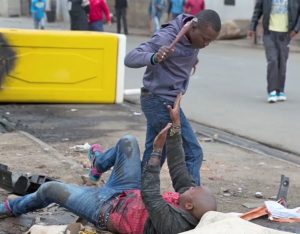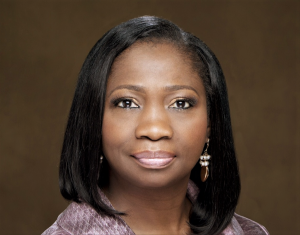“We have reported similar killings to the South African Government and Nigeria High Commission in South Africa and nothing was done to bring the culprits to book. “We want the Nigerian Government to intervene to stop this brutality against innocent Nigerians and stop killing Nigerians out of hatred, racism or xenophobia,’’ ~ Kanayo Onwumelu, Chairman, Western Cape chapter of the union, told the News Agency of Nigeria (NAN)

As a crisis-ridden September came to an end with calm restored after the IPOB/Military clashes, I found time to do a piece on an issue that has been a fixture in the news. It is a source of concern especially for me given the number of my friends and relatives resident in South Africa.
On the 17th of August 2017, I read that a Nigerian was brutally killed by the South African police. The victim, Mr. Uchenna Emmanuel Eloh was reportedly strolling towards a bus park near his home when he was accosted by the police for an on-the-spot search. A usual approach when they suspect an individual might be in possession of an illegal substance. The often routine task turned awry when the policemen assumed that he swallowed the substance and held him by the neck in a bid to stop him. It wasn’t long before he started foaming in the mouth and eventually died from asphyxiation.
Two weeks later the media reported that the Nigeria Union in South Africa confirmed the killing of another of its member by the police. Mr. Kingsley Ikeri, a 27-year-old businessman from Imo state was said to have been killed by the police in Kwazulu Natal Province on the 30th of August.
While these stories were still being hotly debated we were shocked by yet another incident. On the 7th of September Vanguard reported that Mr. Clement Ofoma, 35, was said to have been tortured to death after about 10 policemen arrested him for allegedly dealing in drugs.
And just a few days ago Ibrahim Badmus was reportedly slain by a police officer.
Again and again and again we are assailed with series of similar tragic news and what do we get? Another outrage, another round of condemnation from both governments but the sad reality is that Nigerian families continue losing loved ones with scant chances of ever getting justice. Other victims of this deplorable onslaught against Nigerians include Gideon Ogalaonye, Monday Okorie, Adeniyi Olumoko and Christian Onwukaike, among many others.
These stories are depressing, to say the least, and even more so given that there are no indications of these killings abating anytime soon. I say this because I am aware that the South African police is corrupt, so the perpetrators can easily bribe away these murders under the carpet.
The Senior Special Assistant to the President on Foreign Affairs and Diaspora, Abike Dabiri-Erewa recently revealed that 116 Nigerians have been killed in South Africa via extrajudicial means in the last two years. This figure roughly works out to one per week.

Juxtapose the aforementioned facts with the recurrent xenophobic attacks (the last of which occurred in 2015) and it may be right to say that Nigerians are endangered species in South Africa. It is now an emergency and every responsible government must rise to the task of securing its citizens wherever they reside.
To examine this worrisome trend and proffer solutions it is essential to present a synopsis of some of the numerous causes (direct and indirect) of the extrajudicial killing of immigrants by state actors with particular reference to South Africa.
Whereas it is universally acknowledged that modern states need the police and in some cases, the use of force to provide security, there is a disturbing aberration between the proportionality and necessity of such use in many African nations. It is, therefore, no surprise that excessive use of force was a major factor identified by a study prepared for the UN Special Rapporteur on extrajudicial killings in Africa.
This is particularly so in South Africa where the police force is a fusion of several police organizations much of which had a notorious reputation for brutality, especially during the apartheid era. A 2002 report by Inter-African Network for Human Rights and Development (Afronet) revealed that a total of 2174 people died in the hands of the police between 1997 and 2000. About 95% of this figure resulted from police action.
Sadly there is little the Nigerian government can do about this particular issue. Even though international criminal and humanitarian law take a more stringent view of command responsibility and excessive use of force, the brotherly diplomacy between two African nations will have to be exhausted before Nigeria will consider going further. What we can do, however, is to provide regular counseling for our citizens over there on informal social control and cooperation with the police. The Nigerian embassy in Pretoria can easily arrange this.
South Africa also had the unenviable record of 6 cities among the 10 most dangerous cities in a recent report by worldatlas.com. Furthermore, the ubiquitous proliferation of firearms contributes in no small measure to the high rate of attacks against law enforcement agents.

Whereas existing laws for gun ownership require the applicant to be a South African citizen or a permanent resident, the increased use of illegal short guns for violent crimes lays bare the porosity of the country’s gun laws. A 2015 report by businesstech showed that South Africa had the second highest rate of gun-related deaths in the world. It is therefore not surprising that public opinion seems to endorse brutality by the police and even suggest further arming when the reverse should be the case.
Nigerians should be properly educated on these laws to avoid illegal gun ownership which often makes them easy targets for the police. Again, dissemination of such information should be a simple matter. Bulk messages and regular reminders to citizens on the embassy database will go a long way in informing them properly.
The South African police are equally notorious for extortion and targeted killings. In a study that spawned through 2000–2016, Mark Shaw’s Hitmen for Hire exposed some of the ugliest details of police involvement in underworld murders in South Africa while earlier this year Reuters reported that one Nigerian was suing the police for extortion.
While discussing this issue, a friend had rightly queried: how many South Africans have Nigerians killed especially through peddling narcotics to the young? we must bear in mind the South African police officers also have young people as kids who are usually targeted by narcotics peddlers. It is a known fact that many Nigerians in the country engage in the illicit drug trade and other nefarious activities. We just witnessed a recent massacre in a church in South Eastern Nigeria which was traced to a disagreement between ‘businessmen’ in South Africa.
It will not be far-fetched to suggested that some of these killings could be xenophobic vengeance by some police officers who may be aggrieved at the negative and sometimes fatal effects of drugs on their citizens. Indeed this notion may have been subtly insinuated when the South African home affairs minister Malusi Gigaba quipped “should we start counting how many South Africans have died in South Africa at the hands of Nigerian nationals?” in response to the figure reeled out by Abike Dabiri.
The Nigerian government must now as a matter of urgency begin to explore ways to put an end to this reprehensible trajectory. The history of our relationship with South Africa should not be jeopardized by some corrupt trigger-happy policemen.
While Nigerians contribute an estimated R720m to South African tourism industry annually, we have over 100 South African business organisations currently operating in Nigeria. Their citizens reside and move around freely in our country. Despite alleged restrictive policies that make it arduous for Nigerians to invest in South Africa, companies like MTN continue to cart away profits and evade taxation here. It is time put pressure on South Africa to reciprocate our brotherly care over the years.
The government must rise to this responsibility now.
https://youtu.be/yaqjvEQtl18
Video credit: o’niftvnetwork Youtube





